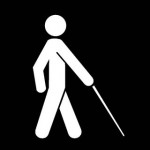What do you want Him to do for you?
 Yesterday I read, in Luke 18, the story of the Blind man Jesus encountered on the way to Jericho. Mark 10 tells us that his name was Bartimaeus. As Jesus was walking by the place where Bart begged, he shouted out to Jesus, “have mercy on me” and the crowd—those who were in front of him—rebuked him. Well, he finally gets Jesus’ attention and then the question is asked, “What do you want me to do for you?”
Yesterday I read, in Luke 18, the story of the Blind man Jesus encountered on the way to Jericho. Mark 10 tells us that his name was Bartimaeus. As Jesus was walking by the place where Bart begged, he shouted out to Jesus, “have mercy on me” and the crowd—those who were in front of him—rebuked him. Well, he finally gets Jesus’ attention and then the question is asked, “What do you want me to do for you?”
When I look back at Mark 10, I realize that just before this episode, Jesus had asked two of his disciples the same question. James and John wanted Jesus to do them a favor and Jesus replied, “What do you want me to do for you?”
They wanted power and authority. They wanted to sit on His right and left when He became King. They wanted to be the most important of the disciples. And Jesus essentially said, “That’s not something that I can promise you.”
Jesus gave a radically different answer to Bart’s request which was polar opposite to the favor His followers had just asked. The beggar said, “Lord, I want to see”. He knew that he was blind, that mercy was required to even get the ear of the Lord, and that the power of God was necessary to address his condition.
The crowd who had good seats to see this miracle-working teacher was annoyed and embarrassed by the beggar behind them. The disciples who were already in the inner circle were jockeying for the position of the coveted ‘most inner circle’. Maybe calling them fanboys and synchophants is too harsh. Regardless, there seems to be a clear case of entitlement mentality in both parties. “We deserve this” is a readily visible attitude, not just in the disciples and the crowd, but in our own lives as well.
Bart didn’t deserve what he was asking. He understood that he didn’t deserve anything. As a beggar in that culture, he knew that nobody was required to give him anything so everything he had was due to the mercy or kindness (or perhaps guilt) of friends, family, and strangers. Bart was the poor in spirit that Jesus talked about. He was about to be blessed.
When I read scripture, I always want to find the metaphorical ‘you are here’ dot (you know, the one that gives your location in the mall?). Who am I in this story? Am I part of the crowd, embarrassed by the passionate cries of a blind beggar that I have effectively learned to ignore all my life? Or am I a disciple who, having given up everything, feels that there is some obligation on God’s part to return the favor?
Though I definitely find a personal point of challenge here, I also know where I want to be—I want to be Bartimaeus: Embracing my constant need for mercy; Recognizing that I am blind and only through the touch of Jesus can I be made to see; Never thinking that God or anybody else owes me a thing; Embracing my great, daily need for God and, regardless of my position or income level, identifying with all those who are poor in spirit, who are promised the Kingdom of Heaven.
